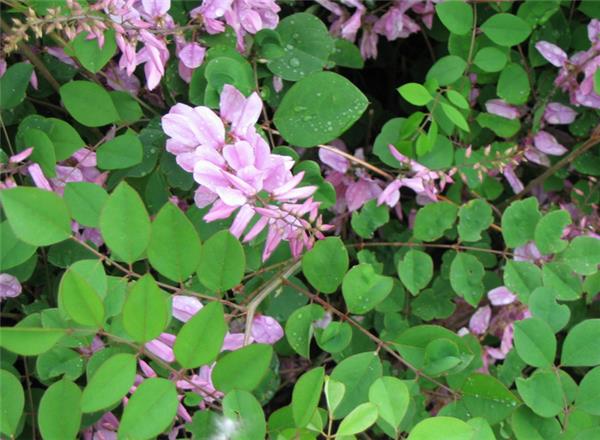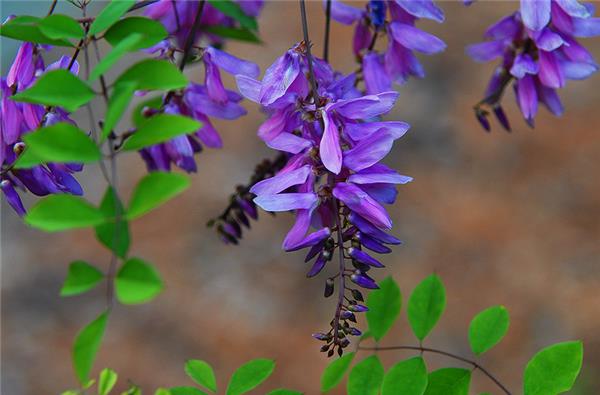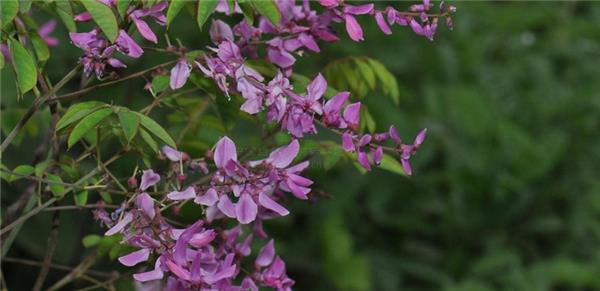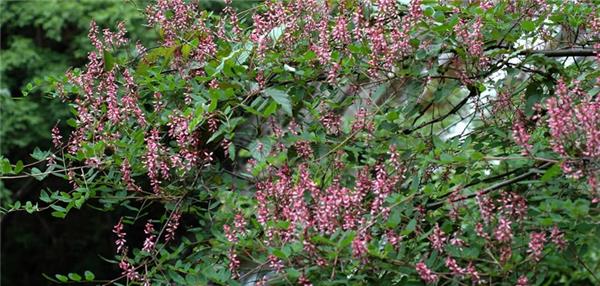Introduction and breeding skills of heroine in flowers
Indigofera is a beautiful flower, it has a long flowering period, it is a good flowering plant in summer and a rare greening and beautification material in the north. Indigofera is not only beautiful in color, but also can clear away heat and detoxify, reduce swelling and pain, and relieve constipation. It has a wide application prospect. Below, let's take a look together.

1. Introduction to Flower Blue
Indigofera gibbsonii, also known as indigofera gibsonii, is a deciduous shrub of the subfamily indigofera in the genus papilionaceae. Adaptability strong, barren resistance, drought resistance, disease resistance is strong, but also more resistant to water and humidity, the soil requirements are not strict. Often born in hillside shrubs and sparse forests or rock crevices. Small bush, pinnate compound leaf is opposite unripe, bine cylinder, summer opens purple-red flower, raceme, very beautiful. Indigofera is a small shrub, 30-100 cm tall. Stems terete, glabrous, young branches angulate, sparsely white t-shaped hairy. Pinnate compound leaves 6-15 cm long; petioles long (0.5-) 1-2.5 cm, leaf rachis slightly flattened above, shallowly grooved, hairy or subglabrous; stipules lanceolate, 4-6 mm long, caducous; Leaflets (2-) 3-5 pairs, opposite, broadly ovate, ovate-rhombic or elliptic, 1.5-4 cm long, 1-2.3 cm wide, apex obtuse or acute, with long cusps, base cuneate or broadly cuneate, green above, pinkish green below, scattered white T-shaped hairs on both surfaces, midvein slightly elevated above, elevated below, lateral veins conspicuous on both surfaces; petiolule 2.5 mm long, densely hairy; stipulule subulate, 2-3 mm long, persistent. Racemes 5-12 (-20) cm long, sparsely flowered; pedicels 1-2.5 cm long, rachis angulate, sparsely white T-shaped; bracts linear-lanceolate, 2-5 mm long; pedicels 3-5 mm long, glabrous; calyx cup-shaped, outside glabrous, ca. 3.5 mm long, calyx tube ca. 1.5 mm long, calyx teeth lanceolate triangular, ciliate, lowermost calyx tooth 2 mm long; Corolla reddish, sparse white, petals subequal, flag elliptic, 12-15 (-17) mm long, ca. 7.5 mm wide, apex rounded, outside glabrous, margin shortly hairy, wing margin hairy; anthers broadly ovate, both ends bearded; ovary glabrous. Pods brown, terete, 3.5-7 cm long, ca. 5 mm in diam., glabrous, endocarp purple spotted, with more than 10 seeds; pedicels spreading; seeds russet, oblong, ca. 5 mm long, ca. 2.5 mm in diam. Flowering may-july, fruiting august.

Second, the cultivation skills of flowers and blues
1. Fruit collection and seed removal
9-10 The pods are collected at any time in the month, and are placed on a flat place for drying. After the pericarp is dried, the seeds are naturally scattered. The seeds of the flower blue are collected, and impurities are removed. They are put into woven bags for drying and storage.
2. Make a bed
Select soil texture for sandy loam to heavy loam and relatively flat place as high bed, bed to north and south and east and west can be. A gentle sunny slope can also be used as a bed horizontally. Bed width 1.2-1.0m, bed height 0.15-0.2m, bed length depends on the ground conditions, generally 20- 50m. Sprinkle farm livestock manure on the bed surface, and put 500kg per 100m2. Turn the bed surface 15~20cm deep, so that the soil and fertilizer are fully mixed.

3. Seed treatment
7-10 days before sowing, seed is put into the bottom of container, 10 times of seed volume of 70 DEG C water is poured into container slowly and completely, and stirred rapidly to room temperature. The next day, pour out the water, mix the seeds with 3 times the volume of sand, put them into woven bags, put them in a 20-25% place, and wait for germination. The seeds can also be soaked in water at 25~30℃ for 24 hours 20 days before sowing, and then mixed with sand and placed in a place at 5-10℃ to wait for germination. Soak seeds in water at about 30℃ for 24h, pour water the next day, cover seeds with sacks and old quilts, and the indoor temperature should be 25-30℃. After that, seed it once every morning with warm water until the seeds sprout and are ready to be sown.

4. Sowing
From mid-April to early May, open 4cm deep ditches along or across the bed with a board pick, and the ditch distance is 25cm. Sprinkle seeds into furrows, seed spacing about 3~ 4 cm. Cover soil thickness 2-3cm, pat and cover soil, seeding rate about 7kg/667m2. It can also be broadcast, that is, seeds are scattered on the bed surface, and then fully covered with soil 2cm thick.
The above is the cultivation method of flowers and trees, I hope it can help you.
Related
- Wuhan Hospital Iron Tree Blooming Result Was Instantly Frightened by the Gardener Master
- Which variety of camellia is the most fragrant and best? Which one do you like best?
- What is the small blue coat, the breeding methods and matters needing attention of the succulent plant
- Dormancy time and maintenance management of succulent plants during dormancy
- Minas succulent how to raise, Minas succulent plant pictures
- What are the varieties of winter succulent plants
- How to raise succulent plants in twelve rolls? let's take a look at some experience of breeding twelve rolls.
- Attention should be paid to water control for succulent plants during dormant period (winter and summer)
- Watering experience of twelve rolls of succulent plants
- Techniques for fertilizing succulent plants. An article will let you know how to fertilize succulent plants.



